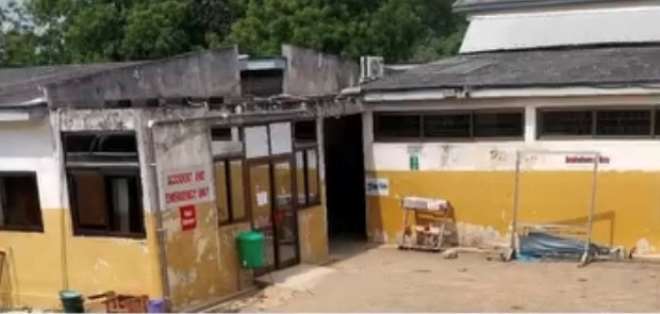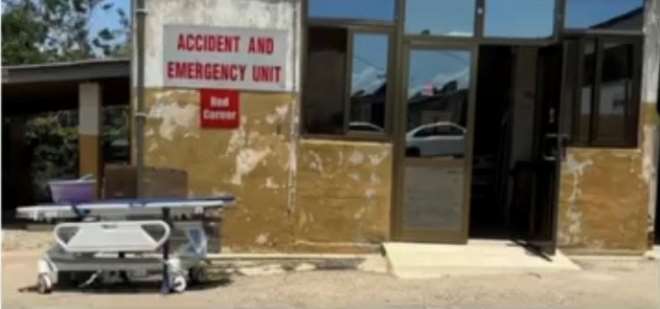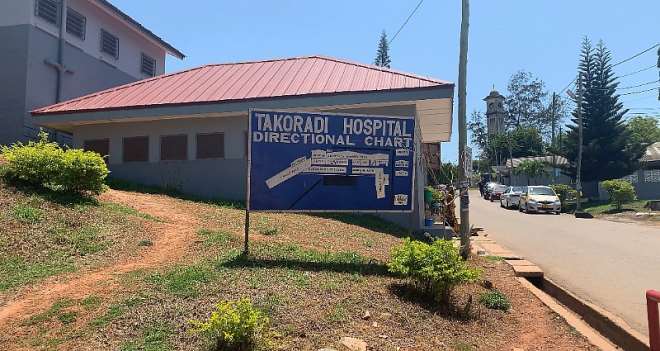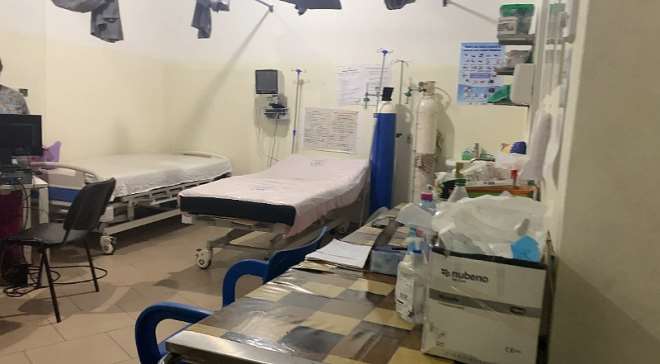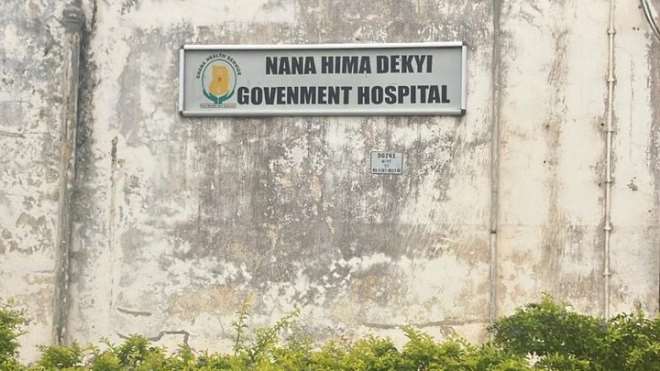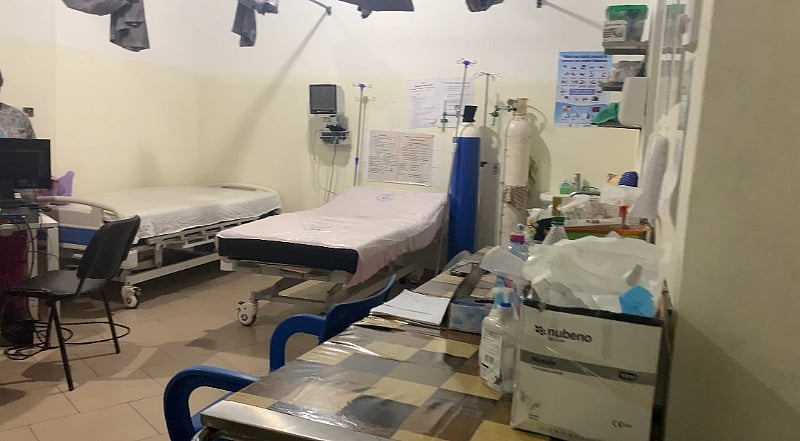In Ghana’s Western Region, falling seriously ill can feel like a death sentence, especially in towns like Dixcove.
At the Dixcove Government Hospital/Nana Hema Dekyi Government Hospital in Ahanta West, cracked walls, leaking roofs, and broken washrooms paint a grim picture. Built by the late chief Nana Hima Dekyi and handed over to the government decades ago, the hospital has never been renovated.
Selina (not her real name), a pregnant woman in the community, shared her fears:
“The building is in a very deplorable state. I get scared sometimes because of the cracks,” she said of the sprawling hospital built in 1972.
A hospital staff source confirmed the facility lacks essential equipment and infrastructure:
“The ceilings leak every time it rains. The building is almost falling apart.”
Salvation from anti-graft drive
But some analysts believe that these desperate conditions could be eased by an anti-corruption drive launched by President John Mahama in the West African country on his re-election six months ago.
“I believe the money can be allocated to support health and many other sectors. However, everything is dependent on government priorities.
On the potential recovered looted funds, transparent and accountable expenditure of the funds should be a core priority. Government should also guide against looting of the recovered funds,” – Maxwell Kpebesaan Kuu-ire. Policy Analyst, West Africa Global Financial Integrity.
The blitz aims to save hundreds of millions of dollars that Ghana is reportedly losing annually through gold and timber smuggling and other illicit financial crimes.
Research by Justice Network Ghana in 2024 also estimated that the country was losing around $1.4 billion yearly due to financial irregularities and tax-related fraud, money which could be used to plug a big gap in state funding for the critical healthcare sector.
According to a report by the nonprofit Swissaid there was a staggering 229 metric tons trade gap, equivalent to $11.4 billion, between Ghana’s gold exports and corresponding imports over just five years, with most of the smuggled gold ending up in Dubai.
President Mahama’s government has acknowledged the need for massive funding of the public health sector, which got a paltry 6.32 percent of the 2025 national budget against a 15 percent benchmark set by African states under what is commonly called the Abuja declaration on health.
President Dramani Mahama has emphasized that the recovered funds would be channeled toward key sectors such as education, healthcare, infrastructure, and social development. He underscored Ghana’s commitment to eradicating corruption, declaring, “Ghana is no longer a ground for corruption.”
Highlighting the significance of the findings, Mahama described the report as both a revelation and a source of hope.
“The scale of financial leakages uncovered is sobering. These are resources that should have been driving our nation forward. However, the report also demonstrates that through collective effort, we can reclaim our losses and deter future acts of economic sabotage,” he added.
Unintended fatalities
The healthcare situation is dire in other areas too.
Takoradi Hospital, a referral facility originally established in 1929, is operating without an Intensive Care Unit (ICU), and emergency cases are often referred to Cape Coast or Accra, with delays that often create tragedies.
Dr. George Peprah, the hospital’s Medical Superintendent, recalled a recent fatality: “A young woman came in with fluid in her lungs. Despite emergency intervention, she died. If we had an ICU, she might have survived.”
He added that the hospital’s asbestos roofing, untouched since construction, leaks during rains:
“We’ve only done occasional patchwork. Replacing the roof is beyond the hospital’s means.”
Logistical challenges are compounding the crisis. Though the hospital received two dialysis machines from the Sekondi-Takoradi Progressive Club Global, demand still outstrips supply.
“Each machine handles four cases daily (which is only two 2 dialysis machines) woefully inadequate,” said Dr. Peprah.
He also noted how lack of space had forced services into unsuitable areas:
“Our dialysis centre is now in what used to be a drug store. We operate with 100 fully-utilised beds and no room for expansion.
Nurses on strike
On June 2, over 128,000 nurses and midwives across Ghana began a nationwide strike, demanding improved conditions of service. The action, led by the Ghana Registered Nurses and Midwives Association (GRNMA), followed the government’s failure to implement the 2024 Conditions of Service Agreement signed over a year ago.
“We’ve sent letters and made visits to the Ministries of Finance and Health, but nothing has been done,” the GRNMA President, Perpetual Ofori Ampofo told a recent press conference in Accra.
The strike severely disrupted healthcare delivery, with patients turned away from hospitals due to the absence of frontline staff.
This is the latest in a series of industrial actions in Ghana’s health sector, driven by recurring issues such as unpaid allowances (fuel, uniform, rural, risk), delayed implementation of agreements, poor working conditions and shortages of equipment and essential supplies.
Underwhelming performance
The government’s flagship Agenda 111 project launched in August 2021 under the NPP designed to construct 111 hospitals across Ghana, including 101 district hospitals, six regional hospitals, two psychiatric hospitals, and the redevelopment of the Accra Psychiatric Hospital aimed to fill these gaps – but results are underwhelming.
A Ministry of Health statement dated March 4, 2025, revealed that while US$400 million has already been spent, none of the 111 hospitals promised are operational.
Initial projections estimated that each hospital would cost approximately $17 million, with an expected completion timeline of 18 months. However, nearly three years later, many of the projects remain incomplete or have barely progressed beyond the foundational stages.
Facilities commissioned in Trede, Kokoben, and Ahanta remain unfinished – with no equipment installed and labs incomplete. The Effia Nkwanta Hospital, the region’s main referral centre, was expected to be ready by December 2024. Construction is still ongoing.
In Bokoro (Ahanta West), the Agenda 111 hospital needs US$ 13 million (approximately GHS 140 million) to function. Health Minister Kwabena Mintah Akandoh, during a March 10 site visit, revealed:
“Only 10% of the required equipment is installed. Completing a hospital isn’t enough – we need an additional $9 million (approximately GHS 92 million) to make it fully operational.”
Redirecting resources
Speaking at the 78th World Health Assembly in Geneva, Deputy Finance Minister Thomas Nyako Ampem said the government is redirecting resources, strengthening public-private partnerships, and implementing structural fiscal reforms to sustain healthcare delivery amid a sharp decline in external aid.
“External aid is no longer a reliable solution,” Mr. Ampem said. “We must prioritise prevention, repurpose budgets, and unlock new investments through good governance and innovation.”
The project received support from the Thomson Reuters Foundation through the Media Foundation for West Africa (MFWA) as part of its global work aimed at strengthening free, fair and informed societies. Any financial assistance or support provided to the journalist has no editorial influence. The content of this article belongs solely to the author and is not endorsed by or associated with the Thomson Reuters Foundation, Thomson Reuters, Reuters, nor any other affiliates.
